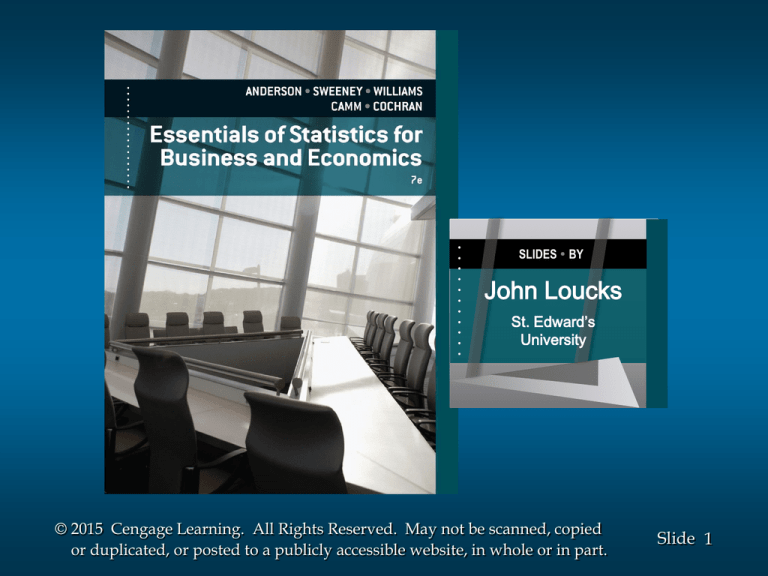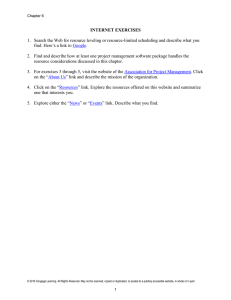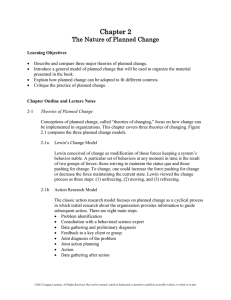
..
.
..
.
..
.
..
.
SLIDES BY
John Loucks
St. Edward’s
University
© 2015 Cengage Learning. All Rights Reserved. May not be scanned, copied
or duplicated, or posted to a publicly accessible website, in whole or in part.
Slide 1
Chapter 13
Multiple Regression
Multiple Regression Model
Least Squares Method
Multiple Coefficient of Determination
Model Assumptions
Testing for Significance
Using the Estimated Regression Equation
for Estimation and Prediction
Categorical Independent Variables
© 2015 Cengage Learning. All Rights Reserved. May not be scanned, copied
or duplicated, or posted to a publicly accessible website, in whole or in part.
Slide 2
Multiple Regression
In this chapter we continue our study of regression
analysis by considering situations involving two or
more independent variables.
This subject area, called multiple regression
analysis, enables us to consider more factors and
thus obtain better estimates than are possible with
simple linear regression.
© 2015 Cengage Learning. All Rights Reserved. May not be scanned, copied
or duplicated, or posted to a publicly accessible website, in whole or in part.
Slide 3
Multiple Regression Model
Multiple Regression Model
The equation that describes how the dependent
variable y is related to the independent variables
x1, x2, . . . xp and an error term is:
y = b0 + b1x1 + b2x2 + . . . + bpxp + e
where:
b0, b1, b2, . . . , bp are the parameters, and
e is a random variable called the error term
© 2015 Cengage Learning. All Rights Reserved. May not be scanned, copied
or duplicated, or posted to a publicly accessible website, in whole or in part.
Slide 4
Multiple Regression Equation
Multiple Regression Equation
The equation that describes how the mean
value of y is related to x1, x2, . . . xp is:
E(y) = b0 + b1x1 + b2x2 + . . . + bpxp
© 2015 Cengage Learning. All Rights Reserved. May not be scanned, copied
or duplicated, or posted to a publicly accessible website, in whole or in part.
Slide 5
Estimated Multiple Regression Equation
Estimated Multiple Regression Equation
y^ = b0 + b1x1 + b2x2 + . . . + bpxp
A simple random sample is used to compute sample
statistics b0, b1, b2, . . . , bp that are used as the point
estimators of the parameters b0, b1, b2, . . . , bp.
© 2015 Cengage Learning. All Rights Reserved. May not be scanned, copied
or duplicated, or posted to a publicly accessible website, in whole or in part.
Slide 6
Estimation Process
Multiple Regression Model
E(y) = b0 + b1x1 + b2x2 +. . .+ bpxp + e
Multiple Regression Equation
E(y) = b0 + b1x1 + b2x2 +. . .+ bpxp
Unknown parameters are
Sample Data:
x 1 x 2 . . . xp y
. .
. .
. .
. .
b0 , b1 , b2 , . . . , bp
b0 , b1 , b2 , . . . , bp
provide estimates of
b0 , b1 , b2 , . . . , bp
Estimated Multiple
Regression Equation
yˆ b0 b1 x1 b2 x2 ... bp xp
Sample statistics are
b0, b1, b2, . . . , bp
© 2015 Cengage Learning. All Rights Reserved. May not be scanned, copied
or duplicated, or posted to a publicly accessible website, in whole or in part.
Slide 7
Least Squares Method
Least Squares Criterion
min ( yi yˆ i )2
Computation of Coefficient Values
The formulas for the regression coefficients
b0, b1, b2, . . . bp involve the use of matrix algebra.
We will rely on computer software packages to
perform the calculations. The emphasis will be
on how to interpret the computer output.
© 2015 Cengage Learning. All Rights Reserved. May not be scanned, copied
or duplicated, or posted to a publicly accessible website, in whole or in part.
Slide 8
Multiple Regression Model
Example: Programmer Salary Survey
A software firm collected data for a sample of 20
computer programmers. A suggestion was made that
regression analysis could be used to determine if
salary was related to the years of experience and the
score on the firm’s programmer aptitude test.
The years of experience, score on the aptitude test
test, and corresponding annual salary ($1000s) for a
sample of 20 programmers is shown on the next slide.
© 2015 Cengage Learning. All Rights Reserved. May not be scanned, copied
or duplicated, or posted to a publicly accessible website, in whole or in part.
Slide 9
Multiple Regression Model
Exper.
(Yrs.)
4
7
1
5
8
10
0
1
6
6
Test
Salary
Score ($1000s)
78
100
86
82
86
84
75
80
83
91
24.0
43.0
23.7
34.3
35.8
38.0
22.2
23.1
30.0
33.0
Exper.
(Yrs.)
9
2
10
5
6
8
4
6
3
3
Test
Salary
Score ($1000s)
88
73
75
81
74
87
79
94
70
89
© 2015 Cengage Learning. All Rights Reserved. May not be scanned, copied
or duplicated, or posted to a publicly accessible website, in whole or in part.
38.0
26.6
36.2
31.6
29.0
34.0
30.1
33.9
28.2
30.0
Slide 10
Multiple Regression Model
Suppose we believe that salary (y) is related to
the years of experience (x1) and the score on the
programmer aptitude test (x2) by the following
regression model:
y = b0 + b1x1 + b2x2 + e
where
y = annual salary ($1000s)
x1 = years of experience
x2 = score on programmer aptitude test
© 2015 Cengage Learning. All Rights Reserved. May not be scanned, copied
or duplicated, or posted to a publicly accessible website, in whole or in part.
Slide 11
Solving for the Estimates of b0, b1, b2
Least Squares
Output
Input Data
x1
x2 y
4 78 24
7 100 43
.
.
.
.
.
.
3 89 30
Computer
Package
for Solving
Multiple
Regression
Problems
b0 =
b1 =
b2 =
R2 =
etc.
© 2015 Cengage Learning. All Rights Reserved. May not be scanned, copied
or duplicated, or posted to a publicly accessible website, in whole or in part.
Slide 12
Solving for the Estimates of b0, b1, b2
Regression Equation Output
Predictor
Constant
EXPER
SCORE
p
Coef
SE Coef
T
3.17394 6.15607 0.5156 0.61279
1.4039 0.19857 7.0702 1.9E-06
0.25089 0.07735 3.2433 0.00478
© 2015 Cengage Learning. All Rights Reserved. May not be scanned, copied
or duplicated, or posted to a publicly accessible website, in whole or in part.
Slide 13
Estimated Regression Equation
SALARY = 3.174 + 1.404(EXPER) + 0.251(SCORE)
Note: Predicted salary will be in thousands of dollars.
© 2015 Cengage Learning. All Rights Reserved. May not be scanned, copied
or duplicated, or posted to a publicly accessible website, in whole or in part.
Slide 14
Interpreting the Coefficients
In multiple regression analysis, we interpret each
regression coefficient as follows:
bi represents an estimate of the change in y
corresponding to a 1-unit increase in xi when all
other independent variables are held constant.
© 2015 Cengage Learning. All Rights Reserved. May not be scanned, copied
or duplicated, or posted to a publicly accessible website, in whole or in part.
Slide 15
Interpreting the Coefficients
b1 = 1.404
Salary is expected to increase by $1,404 for
each additional year of experience (when the variable
score on programmer attitude test is held constant).
© 2015 Cengage Learning. All Rights Reserved. May not be scanned, copied
or duplicated, or posted to a publicly accessible website, in whole or in part.
Slide 16
Interpreting the Coefficients
b2 = 0.251
Salary is expected to increase by $251 for each
additional point scored on the programmer aptitude
test (when the variable years of experience is held
constant).
© 2015 Cengage Learning. All Rights Reserved. May not be scanned, copied
or duplicated, or posted to a publicly accessible website, in whole or in part.
Slide 17
Multiple Coefficient of Determination
Relationship Among SST, SSR, SSE
SST
=
SSR
+
SSE
2
2
2
ˆ
ˆ
(
y
y
)
(
y
y
)
(
y
y
)
+
=
i
i
i i
where:
SST = total sum of squares
SSR = sum of squares due to regression
SSE = sum of squares due to error
© 2015 Cengage Learning. All Rights Reserved. May not be scanned, copied
or duplicated, or posted to a publicly accessible website, in whole or in part.
Slide 18
Multiple Coefficient of Determination
ANOVA Output
Analysis of Variance
SOURCE
Regression
Residual Error
Total
DF
2
17
19
SST
SS
500.3285
99.45697
599.7855
MS
250.164
5.850
F
42.76
P
0.000
SSR
© 2015 Cengage Learning. All Rights Reserved. May not be scanned, copied
or duplicated, or posted to a publicly accessible website, in whole or in part.
Slide 19
Multiple Coefficient of Determination
R2 = SSR/SST
R2 = 500.3285/599.7855 = .83418
© 2015 Cengage Learning. All Rights Reserved. May not be scanned, copied
or duplicated, or posted to a publicly accessible website, in whole or in part.
Slide 20
Adjusted Multiple Coefficient
of Determination
Adding independent variables, even ones that are
not statistically significant, causes the prediction
errors to become smaller, thus reducing the sum of
squares due to error, SSE.
Because SSR = SST – SSE, when SSE becomes smaller,
SSR becomes larger, causing R2 = SSR/SST to
increase.
The adjusted multiple coefficient of determination
compensates for the number of independent
variables in the model.
© 2015 Cengage Learning. All Rights Reserved. May not be scanned, copied
or duplicated, or posted to a publicly accessible website, in whole or in part.
Slide 21
Adjusted Multiple Coefficient
of Determination
Ra2
n1
1 (1 R )
np1
2
20 1
R 1 (1 .834179)
.814671
20 2 1
2
a
81.5% of the variability in programmer salary is
explained by the estimated multiple regression
equation with years of experience and test score
as the independent variables.
© 2015 Cengage Learning. All Rights Reserved. May not be scanned, copied
or duplicated, or posted to a publicly accessible website, in whole or in part.
Slide 22
Assumptions About the Error Term e
The error e is a random variable with mean of zero.
The variance of e , denoted by 2, is the same for all
values of the independent variables.
The values of e are independent.
The error e is a normally distributed random variable
reflecting the deviation between the y value and the
expected value of y given by b0 + b1x1 + b2x2 + . . + bpxp.
© 2015 Cengage Learning. All Rights Reserved. May not be scanned, copied
or duplicated, or posted to a publicly accessible website, in whole or in part.
Slide 23
Testing for Significance
In simple linear regression, the F and t tests provide
the same conclusion.
In multiple regression, the F and t tests have different
purposes.
© 2015 Cengage Learning. All Rights Reserved. May not be scanned, copied
or duplicated, or posted to a publicly accessible website, in whole or in part.
Slide 24
Testing for Significance: F Test
The F test is used to determine whether a significant
relationship exists between the dependent variable
and the set of all the independent variables.
The F test is referred to as the test for overall
significance.
© 2015 Cengage Learning. All Rights Reserved. May not be scanned, copied
or duplicated, or posted to a publicly accessible website, in whole or in part.
Slide 25
Testing for Significance: t Test
If the F test shows an overall significance, the t test is
used to determine whether each of the individual
independent variables is significant.
A separate t test is conducted for each of the
independent variables in the model.
We refer to each of these t tests as a test for individual
significance.
© 2015 Cengage Learning. All Rights Reserved. May not be scanned, copied
or duplicated, or posted to a publicly accessible website, in whole or in part.
Slide 26
Testing for Significance: F Test
Hypotheses
H 0 : b1 = b2 = . . . = bp = 0
Ha: One or more of the parameters
is not equal to zero.
Test Statistic
F = MSR/MSE
Rejection Rule
Reject H0 if p-value < a or if F > Fa ,
where Fa is based on an F distribution
with p d.f. in the numerator and
n - p - 1 d.f. in the denominator.
© 2015 Cengage Learning. All Rights Reserved. May not be scanned, copied
or duplicated, or posted to a publicly accessible website, in whole or in part.
Slide 27
F Test for Overall Significance
Hypotheses
Rejection Rule
H 0 : b1 = b2 = 0
Ha: One or both of the parameters
is not equal to zero.
For a = .05 and d.f. = 2, 17; F.05 = 3.59
Reject H0 if p-value < .05 or F > 3.59
© 2015 Cengage Learning. All Rights Reserved. May not be scanned, copied
or duplicated, or posted to a publicly accessible website, in whole or in part.
Slide 28
F Test for Overall Significance
ANOVA Output
Analysis of Variance
SOURCE
Regression
Residual Error
Total
DF
2
17
19
SS
500.3285
99.45697
599.7855
MS
250.164
5.850
F
42.76
P
0.000
p-value used to test for
overall significance
© 2015 Cengage Learning. All Rights Reserved. May not be scanned, copied
or duplicated, or posted to a publicly accessible website, in whole or in part.
Slide 29
F Test for Overall Significance
Test Statistic
F = MSR/MSE
= 250.16/5.85 = 42.76
Conclusion
F = 42.76 > 3.59, so we can reject H0.
(Also, p-value < .05)
© 2015 Cengage Learning. All Rights Reserved. May not be scanned, copied
or duplicated, or posted to a publicly accessible website, in whole or in part.
Slide 30
Testing for Significance: t Test
Hypotheses
H0 : bi 0
H a : bi 0
Test Statistic
Rejection Rule
t
bi
sbi
Reject H0 if p-value < a or
if t < -taor t > ta where ta
is based on a t distribution
with n - p - 1 degrees of freedom.
© 2015 Cengage Learning. All Rights Reserved. May not be scanned, copied
or duplicated, or posted to a publicly accessible website, in whole or in part.
Slide 31
t Test for Significance
of Individual Parameters
Hypotheses
H0 : bi 0
H a : bi 0
Rejection Rule
For a = .05 and d.f. = 17, t.025 = 2.11
Reject H0 if p-value < .05, or
if t < -2.11 or t > 2.11
© 2015 Cengage Learning. All Rights Reserved. May not be scanned, copied
or duplicated, or posted to a publicly accessible website, in whole or in part.
Slide 32
t Test for Significance
of Individual Parameters
Regression Equation Output
Predictor
Constant
EXPER
SCORE
p
Coef
SE Coef
T
3.17394 6.15607 0.5156 0.61279
1.4039 0.19857 7.0702 1.9E-06
0.25089 0.07735 3.2433 0.00478
t statistic and p-value used to test for the
individual significance of “EXPER”
© 2015 Cengage Learning. All Rights Reserved. May not be scanned, copied
or duplicated, or posted to a publicly accessible website, in whole or in part.
Slide 33
t Test for Significance
of Individual Parameters
Test Statistics
b1 1. 4039
7 . 07
sb1
. 1986
b2 . 25089
3. 24
sb2 . 07735
Conclusions
Reject both H0: b1 = 0 and H0: b2 = 0.
Both independent variables are
significant.
© 2015 Cengage Learning. All Rights Reserved. May not be scanned, copied
or duplicated, or posted to a publicly accessible website, in whole or in part.
Slide 34
Testing for Significance: Multicollinearity
The term multicollinearity refers to the correlation
among the independent variables.
When the independent variables are highly correlated
(say, |r | > .7), it is not possible to determine the
separate effect of any particular independent variable
on the dependent variable.
© 2015 Cengage Learning. All Rights Reserved. May not be scanned, copied
or duplicated, or posted to a publicly accessible website, in whole or in part.
Slide 35
Testing for Significance: Multicollinearity
If the estimated regression equation is to be used only
for predictive purposes, multicollinearity is usually
not a serious problem.
Every attempt should be made to avoid including
independent variables that are highly correlated.
© 2015 Cengage Learning. All Rights Reserved. May not be scanned, copied
or duplicated, or posted to a publicly accessible website, in whole or in part.
Slide 36
Using the Estimated Regression Equation
for Estimation and Prediction
The procedures for estimating the mean value of y
and predicting an individual value of y in multiple
regression are similar to those in simple regression.
We substitute the given values of x1, x2, . . . , xp into
the estimated regression equation and use the
corresponding value of y as the point estimate.
© 2015 Cengage Learning. All Rights Reserved. May not be scanned, copied
or duplicated, or posted to a publicly accessible website, in whole or in part.
Slide 37
Using the Estimated Regression Equation
for Estimation and Prediction
The formulas required to develop interval estimates
for the mean value of y^ and for an individual value
of y are beyond the scope of the textbook.
Software packages for multiple regression will often
provide these interval estimates.
© 2015 Cengage Learning. All Rights Reserved. May not be scanned, copied
or duplicated, or posted to a publicly accessible website, in whole or in part.
Slide 38
Categorical Independent Variables
In many situations we must work with categorical
independent variables such as gender (male, female),
method of payment (cash, check, credit card), etc.
For example, x2 might represent gender where x2 = 0
indicates male and x2 = 1 indicates female.
In this case, x2 is called a dummy or indicator variable.
© 2015 Cengage Learning. All Rights Reserved. May not be scanned, copied
or duplicated, or posted to a publicly accessible website, in whole or in part.
Slide 39
Categorical Independent Variables
Example: Programmer Salary Survey
As an extension of the problem involving the
computer programmer salary survey, suppose that
management also believes that the annual salary is
related to whether the individual has a graduate
degree in computer science or information systems.
The years of experience, the score on the
programmer aptitude test, whether the individual has
a relevant graduate degree, and the annual salary
($000) for each of the sampled 20 programmers are
shown on the next slide.
© 2015 Cengage Learning. All Rights Reserved. May not be scanned, copied
or duplicated, or posted to a publicly accessible website, in whole or in part.
Slide 40
Categorical Independent Variables
Exper. Test
Salary Exper. Test
Salary
(Yrs.) Score Deg. ($1000s) (Yrs.) Score Deg. ($1000s)
4
7
1
5
8
10
0
1
6
6
78
100
86
82
86
84
75
80
83
91
No
Yes
No
Yes
Yes
Yes
No
No
No
Yes
24.0
43.0
23.7
34.3
35.8
38.0
22.2
23.1
30.0
33.0
9
2
10
5
6
8
4
6
3
3
88
73
75
81
74
87
79
94
70
89
Yes
No
Yes
No
No
Yes
No
Yes
No
No
© 2015 Cengage Learning. All Rights Reserved. May not be scanned, copied
or duplicated, or posted to a publicly accessible website, in whole or in part.
38.0
26.6
36.2
31.6
29.0
34.0
30.1
33.9
28.2
30.0
Slide 41
Estimated Regression Equation
y^ = b0 + b1x1 + b2x2 + b3x3
where:
y^ = annual salary ($1000)
x1 = years of experience
x2 = score on programmer aptitude test
x3 = 0 if individual does not have a graduate degree
1 if individual does have a graduate degree
x3 is a dummy variable
© 2015 Cengage Learning. All Rights Reserved. May not be scanned, copied
or duplicated, or posted to a publicly accessible website, in whole or in part.
Slide 42
Categorical Independent Variables
ANOVA Output
Analysis of Variance
SOURCE
Regression
Residual Error
Total
DF
3
16
19
SS
507.8960
91.8895
599.7855
MS
269.299
5.743
R2 = 507.896/599.7855 = .8468
20 1
R 1 (1 .8468)
.8181
20 3 1
2
a
F
29.48
P
0.000
Previously,
R Square = .8342
Previously,
Adjusted
R Square = .815
© 2015 Cengage Learning. All Rights Reserved. May not be scanned, copied
or duplicated, or posted to a publicly accessible website, in whole or in part.
Slide 43
Categorical Independent Variables
Regression Equation Output
Predictor
Constant
EXPER
SCORE
DEGREE
Coef
7.945
1.148
0.197
2.280
SE Coef
7.382
0.298
0.090
1.987
T
1.076
3.856
2.191
1.148
p
0.298
0.001
0.044
0.268
Not significant
© 2015 Cengage Learning. All Rights Reserved. May not be scanned, copied
or duplicated, or posted to a publicly accessible website, in whole or in part.
Slide 44
More Complex Categorical Variables
If a categorical variable has k levels, k - 1 dummy
variables are required, with each dummy variable
being coded as 0 or 1.
For example, a variable with levels A, B, and C could
be represented by x1 and x2 values of (0, 0) for A, (1, 0)
for B, and (0,1) for C.
Care must be taken in defining and interpreting the
dummy variables.
© 2015 Cengage Learning. All Rights Reserved. May not be scanned, copied
or duplicated, or posted to a publicly accessible website, in whole or in part.
Slide 45
More Complex Categorical Variables
For example, a variable indicating level of
education could be represented by x1 and x2 values
as follows:
Highest
Degree
x1
x2
Bachelor’s
Master’s
Ph.D.
0
1
0
0
0
1
© 2015 Cengage Learning. All Rights Reserved. May not be scanned, copied
or duplicated, or posted to a publicly accessible website, in whole or in part.
Slide 46
End of Chapter 13
© 2015 Cengage Learning. All Rights Reserved. May not be scanned, copied
or duplicated, or posted to a publicly accessible website, in whole or in part.
Slide 47







